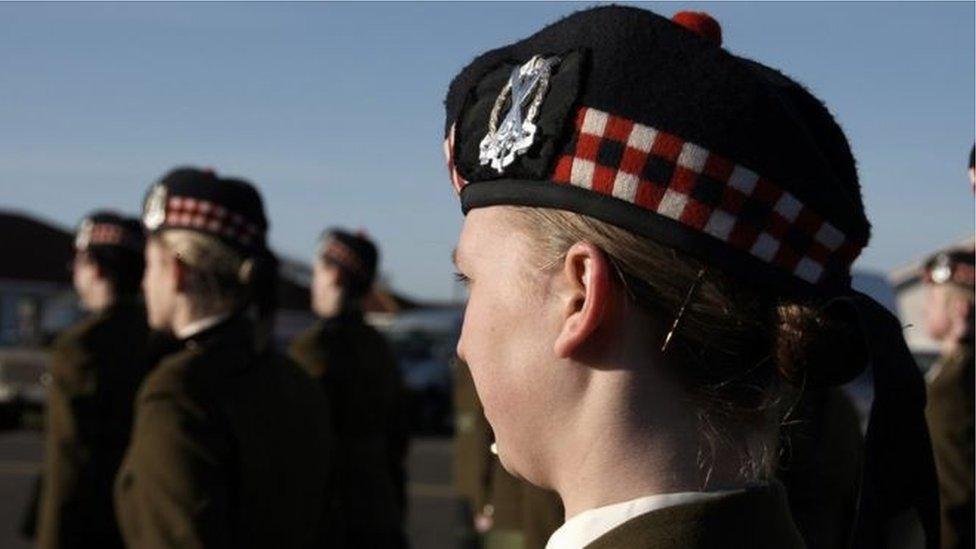UK government reviews tax 'hikes' for Scotland-based personnel
- Published
- comments

The UK government says military personnel should not feel punished for working in Scotland
The UK government says it is looking at ways to "counter tax rises" for armed forces personnel based in Scotland.
It follows the decision by the Scottish government to bring in new income tax bands which it is estimated could affect 8,000 members of the military.
The changes will see the introduction of a 19p "starter" rate for lower earners and a 21p "intermediate" rate.
The Scottish government said it had offered to look at ways to address the tax differential of military personnel.
The Conservatives and Labour opposed the tax changes, which will come into force from the start of the new financial year in April.
The UK defence secretary, Gavin Williamson, has described the new banding system as an "SNP tax hike".
He says it unfairly hits 70% of personnel based in Scotland, leaving thousands out of pocket.
'Huge contribution'
Mr Williamson confirmed an "urgent review" is under way to look at how to counter what he called "the unjustified raid on pay packets".
He said: "I am working to ensure that those who are affected do not feel they are being punished by serving in Scotland."
The Scottish government has announced that, as well as the new starter and intermediate rates, higher and additional rates will also be increased to 41p and 46p respectively.
It says those earning more than £26,000 will pay slightly more tax but the poorest - and 70% of all income taxpayers in general - will pay less.
In the armed forces, it is thought a staff sergeant would pay an extra £117 a year in Scotland.
An army major would pay an extra £660 while a lieutenant colonel would pay £863 more. A full colonel would have to pay an extra £1,013.
A Scottish government spokesman said Keith Brown, Cabinet Secretary for the Economy, Jobs and Fair Work, wrote to the UK Defence Secretary in February "with an offer to consider constructive proposals".
'Attractive place to live'
The spokesman added: "He was clear that any proposals must respect the Scottish government's income tax policy, and in particular should not disadvantage those earning under £26,000 who will pay less under our income tax proposals than they would under tax rates applicable in the rest of the UK. It is disappointing that no response has yet been received.
"The new starter rate we are proposing, combined with an increase in the personal allowance, will result in 70% of all income taxpayers paying less tax than they do this year for a given wage, and 55% of Scottish income taxpayers will pay less tax than people earning the same amount and living in the rest of the UK in 2018-19.
"We are fully committed to supporting the armed forces community. Service provision varies in different parts of the UK and Scotland continues to be an attractive place to live, work and do business with access to many services not available elsewhere in the UK such as free school meals, personal care, prescriptions and eye tests, and university tuition when they are ordinarily resident.
"The definition of who is a Scottish taxpayer is set out in UK legislation and is a matter for HMRC."
Mr Brown told BBC Radio's Good Morning Scotland programme: "The lowest-paid personnel among the UK service personnel are the ones who are being hit hardest and I think it's very important that we make it more attractive for them to join the forces to help address the crisis which senior military figures are saying is at an all-time low."
He pointed out that service personnel in Scotland benefit from free tuition fees, free prescriptions and lower council tax.
He added: "I will approach this with an open mind [the review] but I will not countenance lower-paid service personnel in Scotland having to pay more because of the result of a Tory review."
Scotland Secretary David Mundell said: "Our servicemen and women make a huge contribution to the communities and the economy of Scotland.
"The Scottish government's decision to make Scotland the most highly-taxed part of the UK means they would be penalised for being stationed here.
"It's absolutely right we take steps to address that."